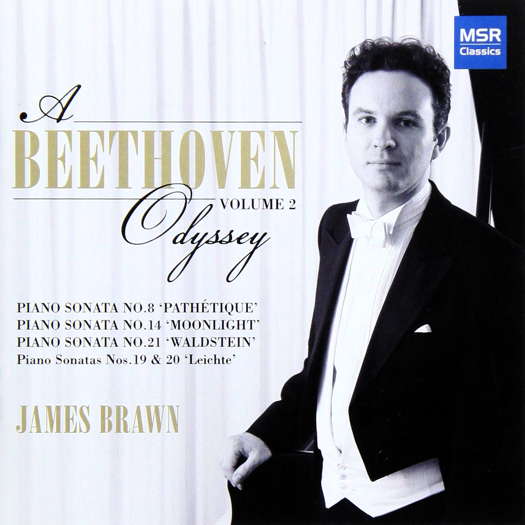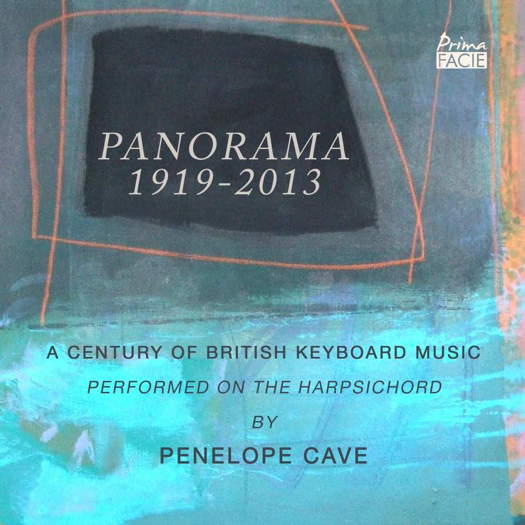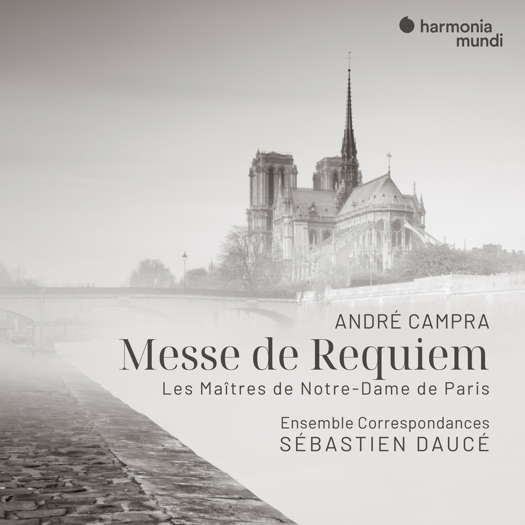- wolf
- Erwin Schulhoff
- Istituzione Universitaria dei Concerti
- Countess of Harewood
- Lysenko
- Ludovic Tézier
- Josefine Winter
- Victoria University
 SPONSORED: CD Spotlight. Perfect Indeed - More Beethoven from James Brawn, recommended by Andrew Schartmann.
SPONSORED: CD Spotlight. Perfect Indeed - More Beethoven from James Brawn, recommended by Andrew Schartmann.
All sponsored features >>
 SPONSORED: CD Spotlight. A Fantastic Collection. Penelope Cave Panorama CD. Little-known harpsichord gems, strongly recommended by Alice McVeigh.
SPONSORED: CD Spotlight. A Fantastic Collection. Penelope Cave Panorama CD. Little-known harpsichord gems, strongly recommended by Alice McVeigh.
All sponsored features >>

Deeply Moving Throughout
GERALD FENECH listens to Campra's 'Messe de Requiem'
'... an inspiring programme brimming with music of the utmost beauty and reverential nobility ...'
André Campra (1660-1744) was the son of Giovanni Francesco Campra, a surgeon and violinist from Graglia, Italy and Louise Fabry from Aix-en-Provence. His father was his first music teacher. He was baptized on 4 December 1660 in the Église de la Madeleine in Aix. He became a choir boy in the Cathedrale Saint-Sauver in 1674 and, four years later, he commenced ecclesiastical studies at this same place. In 1681 he was severely reprimanded by his superiors for having taken part in theatrical performances without permission. Nevertheless, on 27 May of that same year, he was made a chaplain.
Campra served as 'maître de musique' at the Cathedrals of Arles and Toulouse and then, from 1694 to 1700, served in a similar capacity at the Cathedral of Notre-Dame de Paris. Campra added violins to the performance of sacred music at the Paris Cathedral, a controversial innovation in an era when they were considered street instruments.
He began to compose for the theatre in 1697 and published some theatrical compositions under his brother's name to protect his reputation with church authorities. In 1700 he gave up his post at Notre-Dame and devoted himself totally to theatrical music with critical success. By 1705 he was such a musical celebrity that he became a target for negative articles in the press. In 1720 he finally decided to devote himself completely to sacred music.
Listen — Campra: Et lux perpetua (Messe de Requiem)
(HMM 902679 track 21, 0:00-0:50) ℗ 2024 Harmonia Mundi Musique sas :
Although Campra had obtained critical success he lacked financial security. In 1722 he was briefly engaged as 'maître de musique' by the Prince of Conti. After the death of the regent Philippe d'Orleans in December 1723, Campra became 'sous-maître' at the Royal Chapel in Versailles. His last appointment was that of 'Inspector General' at the Royal Academy of Music in 1730. Campra died in Versailles on 29 June 1744 at the age of eighty-three, leaving for posterity several 'tragedies en musique' and opera-ballets.
In the sphere of sacred music he wrote three books of cantatas, a sizeable amount of motets and other religious pieces, including the requiem on this recording.
Listen — Campra: Kyrie eleison (Messe de Requiem)
(HMM 902679 track 12, 0:00-0:50) ℗ 2024 Harmonia Mundi Musique sas :
The 'Messe des Morts' remains to this day Campra's greatest sacred work, and although the circumstances surrounding its composition remain unclear, several hypotheses have been put forward which between them assign it to every period of Campra's working life. The piece enjoyed great popularity throughout the eighteenth century, mainly in the provinces, and was one of the iconic compositions most regularly performed at extraordinary ceremonies. Indeed, it enjoyed great success in the composer's native region and the south-eastern quarter of France.
Listen — Campra: Sanctus (Messe de Requiem)
(HMM 902679 track 17, 0:00-0:43) ℗ 2024 Harmonia Mundi Musique sas :
Evidence of its dissemination is relatively plentiful in the second half of the eighteenth century, a period when the regional press was developing, providing a wealth of information on musical life in the provinces in the dying days of the Ancien Regime.
This is an inspiring programme brimming with music of the utmost beauty and reverential nobility that is deeply moving throughout. Four other composers: François Cosset (circa 1610-circa 1673), Jean Veillot (circa 1600-1662), Jean Mignon (1640-1708) and Pierre Robert (circa 1622-1699) also contribute to this ethereal experience.
Listen — François Cosset: Gloria (Domine salvum fac regem)
(HMM 902679 track 2, 1:11-2:09) ℗ 2024 Harmonia Mundi Musique sas :
A disc for all seasons that cannot be missed.
Copyright © 4 September 2024
Gerald Fenech,
Gzira, Malta



